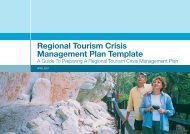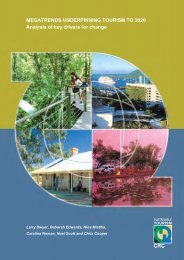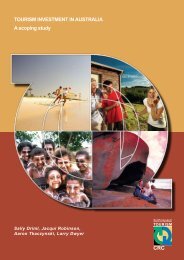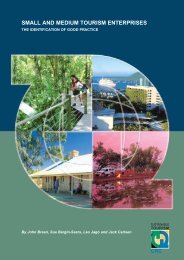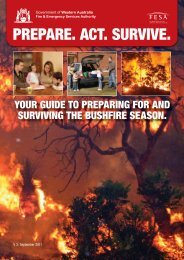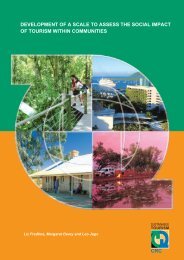Tourism Risk Management - Sustainable Tourism Online
Tourism Risk Management - Sustainable Tourism Online
Tourism Risk Management - Sustainable Tourism Online
You also want an ePaper? Increase the reach of your titles
YUMPU automatically turns print PDFs into web optimized ePapers that Google loves.
• Seek increases in promotional budgets<br />
A crisis usually results in more government attention for the tourism industry than it would receive<br />
under normal circumstances. Use the opportunity to seek increases in promotional budgets which will<br />
be needed to help the industry recover and stimulate visitors to return.<br />
• Initiate financial assistance and/or fiscal measures to support tourism companies<br />
Governments need to work closely with the industry in difficult times to ensure that there is not a<br />
damaging loss of product that could limit recovery. Temporary tax incentives, subsidies, reduced<br />
airport charges and free visas are some of the measures taken to encourage tour operators, airlines,<br />
and cruise companies to continue operating immediately following a crisis.<br />
• Set up a hotline<br />
If there is an emergency call centre in operation, it can become the hotline for inquiries from visitors<br />
and their families. If there is no call centre, one needs to be set up immediately with multilingual<br />
operators who have a good understanding of security issues. A sample hotline questionnaire is<br />
included in UNWTO’s Handbook on Natural Disaster Reduction in <strong>Tourism</strong> Areas. Promote the<br />
existence of the hotline in news briefings and on the destination website.<br />
• Monitor what is being done to improve safety and security<br />
Participate in inter-agency meetings to brief them on your tasks and situation and to identify the<br />
progress of response and recovery activities; keep your organization and industry informed about<br />
what disaster management or security services are doing to address issues and improve safety.<br />
• Coordinate with disaster management agencies to arrange media access<br />
Where possible, try to help organize reasonable media access to the stricken area through the<br />
disaster management agencies. Some years ago, a Caribbean country tried to restrict access to an<br />
area hit by a hurricane. CNN simply hired a helicopter to fly over and take ‘exclusive’ pictures of the<br />
devastation. The images were all the more powerful because they were ‘banned’ by authorities.<br />
• Communicate internally<br />
In the heat of a crisis, internal communication often gets overlooked. But it is important to keep all<br />
tourism staff up to date with what is being done to end it. Not only does it strengthen the tourism<br />
team, it can also prevent incorrect information being spread.<br />
C) Quick research tactics<br />
• Get to know your visitors<br />
Send out survey teams to find out who is travelling during the crisis, where they come from and why,<br />
then feed information back immediately to the promotion department.<br />
• Monitor media reports<br />
Keep track of what is being published and broadcast about your destination and feed that information<br />
back to the communications and promotion departments. Even if media monitoring is normally the<br />
responsibility of the communications department, they will be stretched too thin during a crisis and<br />
will appreciate the assistance.<br />
III. Recovering Visitor Confidence<br />
While media attention moves quickly to fresh stories, the damage wrought by a crisis can stay in the<br />
minds of potential visitors for a long time. Recovery demands a redoubling of efforts, especially in the<br />
areas of communications and promotion.<br />
<strong>Tourism</strong> <strong>Risk</strong> <strong>Management</strong> – An Authoritative Guide to Managing Crises in <strong>Tourism</strong> 79




